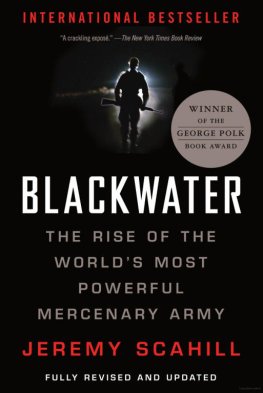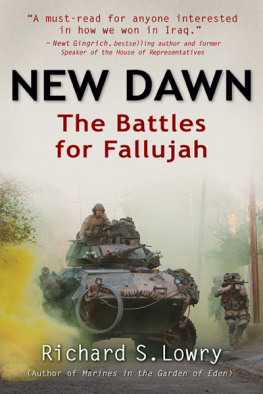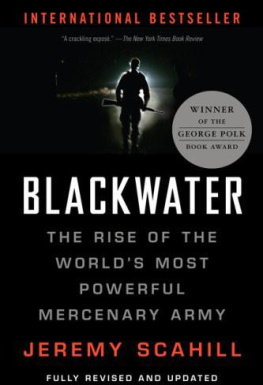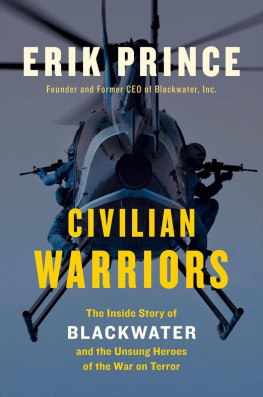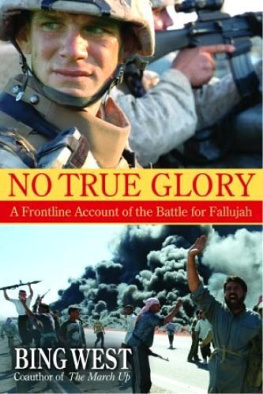A crackling expos New York Times Book Review
Blackwater is the utterly gripping and explosive story of how the Bush administration has spent tens of millions of dollars building a parallel corporate army that functions in Iraq outside the law an army so loyal to far right causes it constitutes nothing less than a Republican Guard. The most important and chilling book about the death throes of U.S. democracy you will read in years and a triumph of investigative reporting Naomi Klein, Guardian
Long before the mainstream media and Congress were paying attention, Scahill exposed the workings of this lawless private army. Its an amazingly researched and well-told story of the nexus between far-right fundamentalists, the Bush-Cheney war machine, privatisation, and profiteering. Matthew Rothschild for The Progressive
Scahill provided me information which I have not been able to get from the U.S. military I have read more from Mr. Scahill than Ive got from our government. Representative Marcy Kaptur, Defense Appropriations Committee
Blackwater raises a lot of deeply disturbing questions about where Americas military is being led by this new breed of free-market mercenaries Chris Barsanti, In These Times
Terrifying and thrillingly written Arundhati Roy, author of The God of Small Things
This is no uninformed partisan screed Metriculously documented and encyclopaedic in scope its a comprehensive and authoritative guide this book serves as a provocative primer for advancing the debate. Virginian-Pilot
Andy McNab couldnt have invented this prescient tale of the private army of mercenaries run by a Christian conservative millionaire who, in turn, bankrolls the president. A chilling expos of the ultimate military outsource. Christopher Fowler, New Review
Fascinating and magnificently documented belongs on the reading list of any conscientious citizen. Scott Horton, Columbia University Law School
The sternest message of this book has to do with the dangers a mercenary army poses, and always has: that it can always be turned on its host. John Freeman, President of the National Book Critics Circle
Jeremy Scahills expos of the Blackwater mercenary firm forcefully demonstrates the grave dangers of outsourcing the governments monopoly on the use of force Joseph Wilson, former U.S. Ambassador to Iraq
Jeremy Scahill actually doesnt know anything about Blackwater. Martin Strong, vice president, Blackwater Worldwide
JEREMY SCAHILL is an international journalist who has covered the war in Iraq; the downfall of Milosevics government in Serbia; the role of the Chevron oil corporation in the massacre of protesting villagers in the Niger Delta; and the involvement of mercenaries in New Orleans following Hurricane Katrina. He was among the few western reporters to gain access to Abu Ghraib prison when Saddam Hussein was in power. A frequent contributor to The Nation magazine and a correspondent for U.S. radio and television, Scahill has won numerous awards for his investigative journalism. Blackwater is his first book.
BLACK WATER
THE RISE OF THE WORLDS MOST POWERFUL MERCENARY ARMY
JEREMY SCAHILL

A complete catalogue record for this book
can be obtained from the British Library on request
The right of Jeremy Scahill to be identified as the author of this work
has been asserted by him in accordance with the
Copyright, Designs and Patents Act 1988
Copyright 2007, 2008 Jeremy Scahill
All rights reserved. No part of this publication may be reproduced, stored in a retrieval system or transmitted in any form or by any means, electronic, mechanical, photocopying, recording or otherwise, without the prior permission of the publisher.
First published in the USA in 2007 by
Nation Books, a member of the Perseus Books Group
This updated paperback edition published in 2008
First published in the UK in 2007 by
Serpents Tail,
an imprint of Profile Books Ltd
3A Exmouth House
Pine Street
Exmouth Market
London EC1R 0JH
website: www.serpentstail.com
ISBN 978 1 84668 652 8
Printed by CPI Bookmarque, Croydon, CR0 4TD

For unembedded journalists, particularly Arab media workers, who risk and often lose their lives to be the eyes and ears of the world. Without their courage and sacrifice, history would indeed be written by self-declared victors, the rich, and the powerful.
CONTENTS
AUTHORS NOTE
THIS BOOK would not have been possible without the tireless efforts of my colleague Garrett Ordower. Garrett is a remarkable investigative journalist who spent countless hours filing Freedom of Information Act requests, researching complicated people and events, digging up facts and figures, and interviewing sources. He also wrote solid first drafts of some chapters for this book. I am forever grateful to Garrett for his diligent and careful work on this project and his unflinching dedication to old-fashioned muckraking. This book is as much his as it is mine. I look forward to Garretts future endeavors in law and journalism and would be honored to work with him again.
Additionally, I would like to thank Eric Stoner who provided research assistance in the paperback updates of this book. I also wish to alert the reader to the fact that Blackwater refused to grant me interviews with company executives. A spokesperson did write to thank me for my interest in Blackwater but said that the company was unable to accommodate my request for interviews with the men who run Blackwater. I am indebted to the solid reporting of Jay Price and Joseph Neff of the Raleigh News & Observer and Bill Sizemore and Joanne Kimberlin of the Virginian-Pilot newspapers. These reporters and their groundbreaking work have done the public a great service in chronicling the Blackwater story and the explosive growth of the private military industry. Special thanks also to T. Christian Miller of the Los Angeles Times and Anthony Shadid and Rajiv Chandrasekaran of the Washington Post, as well as authors P. W. Singer and Robert Young Pelton. I would encourage readers to read the acknowledgments at the end of this book for a more comprehensive understanding of the number of people who contributed to this process.
THE FACE OF BLACKWATER
October 2, 2007
Washington D.C.
ERIK PRINCE, the boy-faced thirty-eight-year-old owner of Blackwater, marched confidently into the regally decorated chamber of the Congressional hearing room and was immediately swarmed by a mob of paparazzi. Cameras flashed and heads turned inside the packed room. The man at the helm of a small army of mercenaries was escorted not by his elite squad of exNavy SEALs and Special Forces operators but by an army of lawyers and advisers. Within minutes, his image would be beamed across the globe, including onto television screens throughout Iraq, where rage against his men was building by the moment. His company wasnow infamous, and for the first time since the occupation began, it had a face.
It was a moment Prince had long resisted. Before that warm October day in Washington in 2007, he had shunned the spotlight, and his people were known to stifle journalists attempts at taking his picture. When Prince did appear in public, it was almost exclusively at military conferences, where his role was to extol the virtues of his company and its work for the U.S. government, which consisted, in part, of keeping alive the most hated officials in Iraq. Since September 11, Blackwater had risen to a position of extraordinary prominence in the war on terror apparatus, and its contracts with the federal government had grown to more than $1 billion. On this day, the man in control of a force at the vanguard of the Bush administrations offensive war in Iraq would be on the defensive.
Next page


